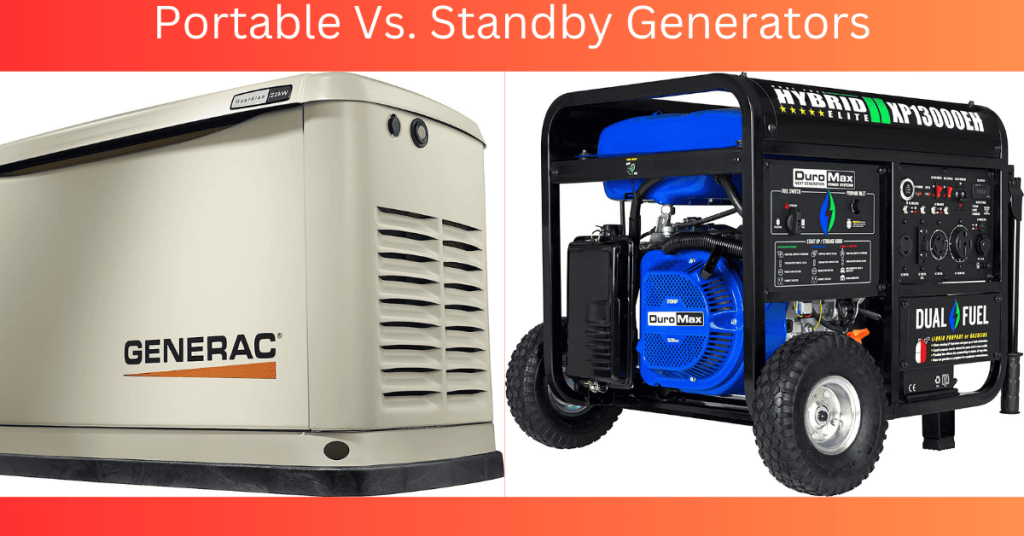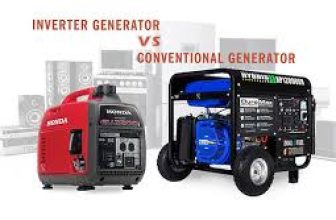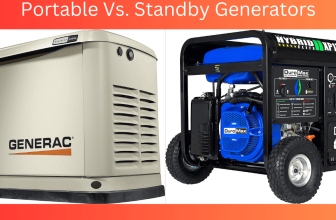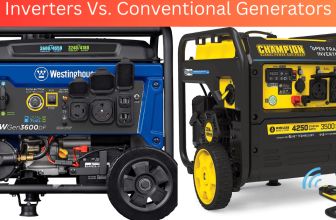Choose Wisely: Standby Or Portable Generator?
Picture this: a sudden power outage has left you in the dark, unable to use any of your electronic devices or appliances. You try to call your power company, but the line is busy.
As the minutes turn into hours, you start to feel increasingly frustrated and helpless. This scenario is not uncommon, especially in areas prone to extreme weather conditions or grid failures.
That’s where generators come in – they provide a reliable source of backup power that can keep your home or business running smoothly during power outages. But with so many types of generators available, which one should you choose?
In this article, we’ll explore the differences between standby and portable generators, and help you make an informed decision based on your needs and preferences.
Key Takeaways
- Standby generators provide a more reliable source of backup power during outages, while portable generators are versatile and can be moved around.
- Standby generators require professional installation and less maintenance, while portable generators are easier to install but require more maintenance.
- Cost should be weighed against the benefits when considering a portable generator, but potential savings on expenses incurred during a power outage can offset the cost.
- Safety is crucial when using a portable generator, as carbon monoxide poisoning is a major risk. It’s important to assess power needs and prioritize essential appliances and electronics.

Understanding the Differences between Standby and Portable Generators
You’ll want to understand the differences between standby and portable generators, as they each have their own unique advantages and limitations.
Standby generators are designed to provide backup power to your home or business during power outages and can run on either natural gas or propane. They are permanently installed and are connected to your electrical system, so they automatically start up when the power goes out. This makes them ideal for those who want a reliable source of backup power without having to worry about manually starting up the generator.
Portable generators, on the other hand, are designed to be moved around and can be used for a variety of purposes. They are typically powered by gasoline and can be used to power small appliances, power tools, and even RVs. While they are not as powerful as standby generators, they are more versatile and can be used in a variety of situations. They are also less expensive than standby generators, making them a good choice for those who are on a budget.
Understanding the differences between standby and portable generators is important when deciding which one to choose. While both types of generators have their own advantages and limitations, it ultimately comes down to what your specific needs are.
In the next section, we’ll talk about power output and how it affects your decision.
Power Output
If you’re looking for a reliable source of power during an outage, it’s important to consider the amount of power output you require. Portable generators typically have a lower power output, usually ranging from 3,000 to 8,500 watts, making them suitable for powering small appliances and electronics.
On the other hand, standby generators can produce up to 20,000 watts of power, enough to power an entire home or business. It’s important to assess your power needs and choose the generator that can provide the necessary output to keep your essential appliances running during an emergency.
It’s important to consider not only the amount of power output but also the quality of the power produced when choosing a generator. Standby generators are designed to produce clean and stable power, similar to the power supplied by your utility company. This is important for sensitive electronics and appliances that require a stable power supply to function properly.
Portable generators, on the other hand, may produce unstable power that can damage your electronics if not used with caution. Choosing the right generator for your needs can be overwhelming, but understanding the power output is a crucial aspect of the decision-making process.
After all, whether you’re powering just a few appliances or your entire home or business, you need a generator that can provide reliable and stable power. With that in mind, let’s move on to the next step: installation and maintenance.
Installation and Maintenance
Proper installation and regular maintenance are crucial for ensuring your generator operates efficiently and reliably during an emergency. When it comes to installation, you need to consider the location, fuel source, and electrical connections.
A standby generator requires a professional installation, which includes a concrete pad, fuel source hook-up, and electrical wiring. On the other hand, a portable generator is easier to install as it only requires a fuel source and electrical connections. However, you need to ensure that the generator is placed in a well-ventilated area to prevent carbon monoxide poisoning.
Maintenance is also essential to ensure that your generator is always ready to run when you need it. Regular maintenance includes changing the oil, air filter, and spark plug as recommended by the manufacturer. This not only ensures that the generator runs efficiently but also extends its lifespan.
A standby generator requires less maintenance as it runs weekly self-diagnostic checks, notifying you of any issues. A portable generator, on the other hand, requires more maintenance, as it is not used as frequently.
Proper installation and regular maintenance are crucial for ensuring your generator operates efficiently and reliably during an emergency. While a standby generator requires professional installation, it requires less maintenance. A portable generator, on the other hand, is easier to install but requires more maintenance.
In the next section, we’ll discuss the noise level, which is an important factor to consider when choosing between a standby and portable generator.
Noise Level
When considering a generator, we need to think about the noise level. Your choice will depend on your needs and preferences. There are two main options: quiet and automatic or loud and manual.
Additionally, it’s important to research noise regulations in your area to ensure compliance.
Quiet and Automatic vs. Loud and Manual
As you weigh your options between a quiet and automatic generator or a loud and manual one, remember that choosing the former is like playing a soothing melody while the latter is like banging on pots and pans.
A quiet and automatic generator automatically turns on when power is lost, so there’s no need to go outside and manually start it up. With the sound of a gentle hum, it provides power to your home without disturbing your neighbors or causing unnecessary noise pollution.
A loud and manual generator, on the other hand, requires you to go outside and start it up yourself. Not only is it a hassle to do so, but it can also disrupt your neighbors and cause a disturbance in your community.
It’s important to consider the impact of your generator on those around you and choose a generator that is both efficient and quiet. With that in mind, it’s also important to look into noise regulations in your area to ensure that your generator is compliant with local laws.
Noise Regulations in Your Area
It’s essential to know the noise regulations in your area before purchasing and installing a generator, as you don’t want to cause any disturbances or violate any laws. Here are some things to consider when researching noise regulations:
- Check with your local government or neighborhood association for any specific noise ordinances in your area. Some cities and towns may have specific decibel limits or time restrictions for generator use.
- Consider the location of your generator. Placing it in an enclosed space or installing sound-dampening materials can help reduce noise levels and prevent disturbances to your neighbors.
- Look for generators that are designed to be quiet. Some models come with noise-reducing technology and features like soundproof casings to minimize noise levels.
- Be considerate of your neighbors. Let them know about your generator, and ask if they have any concerns or preferences for when you use it.
Understanding the noise regulations in your area can help you choose a generator that meets your needs while also being considerate of those around you.
Now, let’s take a look at another important factor to consider: cost.
Cost
Choosing a portable generator can be a pricey investment, but as the saying goes, you get what you pay for. The cost of a portable generator can vary depending on its size, brand, and power output. Generally, a larger and more powerful generator will come with a higher price tag.
However, it’s important to keep in mind that a portable generator can be a versatile and valuable tool to have in emergency situations. When considering the cost of a portable generator, it’s important to weigh the benefits against the price.
A portable generator can provide power to your home during a power outage, allowing you to keep essential appliances running and your family comfortable. It can also be used for outdoor activities like camping or tailgating. Additionally, the cost of a portable generator may be offset by potential savings on food spoilage, hotel stays, and other expenses incurred during a power outage.
While cost is certainly an important factor to consider when choosing between a standby or portable generator, it’s not the only consideration. Safety is also a crucial aspect to keep in mind. It’s important to make sure that you follow all safety guidelines and regulations when using a portable generator to avoid potential hazards.
With that said, let’s move on to the next section and discuss some important safety considerations when using a portable generator.
Safety Considerations
To ensure safe usage of a portable generator, it’s crucial to follow all guidelines and regulations to avoid potential hazards. Here are three important safety considerations that every owner should keep in mind:
- Carbon monoxide poisoning is a major risk associated with portable generators. These machines emit carbon monoxide, which is a colorless and odorless gas that can be lethal if inhaled in large quantities. To prevent this, you should always place your generator outdoors and at least 20 feet away from any open windows or doors. Additionally, it’s recommended that you install carbon monoxide detectors in your home to alert you in case of any leaks.
- Another important safety concern is the risk of electrocution. Portable generators should never be used in wet or damp conditions, and you should never touch them with wet hands or while standing in water. It’s also important to use ground fault circuit interrupters (GFCIs) to protect against any electrical shocks.
- Lastly, it’s important to follow proper storage and maintenance practices to prevent any accidents. Always store your generator in a cool, dry place, and make sure to properly dispose of any fuel or oil. Additionally, you should have your generator serviced regularly to ensure that it’s in good working order.
By keeping these safety considerations in mind, you can ensure that you’re using your portable generator in a safe and responsible manner.
Now, let’s move on to the next section and explore how to choose the right generator for your needs.
Choosing the Right Generator for Your Needs
When it comes to choosing the right generator for our needs, we need to assess our power needs, consider our budget and lifestyle, and consult with a professional.
First, we need to determine how much power we need to run our essential appliances and devices during a power outage.
Second, we need to consider our budget and lifestyle to decide whether a standby or portable generator is the best option for us.
Finally, we should consult with a professional to ensure that we choose the right generator and install it safely and correctly.
Assessing Your Power Needs
Assessing your power needs can be done by determining the essential appliances and electronics that require electricity. Begin by going through your home and making a list of all the items that would need to be powered during an outage. This could include items like refrigerators, freezers, medical equipment, and communication devices.
Once you have your list, categorize the items into two groups: those that are essential for survival and those that are not. It’s important to note that you may need to prioritize your power needs based on the length of the outage. If you’re only without power for a few hours, you may not need to worry about powering every item on your list. However, if you’re without power for days or even weeks, you’ll want to make sure you have enough electricity to keep your essential items running.
With this in mind, it’s important to consider the power capacity of your generator and how long it can run before needing to be refueled. Once you’ve assessed your power needs, you can move on to considering your budget and lifestyle, which we’ll discuss in the next section.
Remember, the key to choosing the right generator is to determine your power needs and prioritize them accordingly. By doing so, you’ll ensure that you have enough power to keep your essential items running during an outage. Now, let’s move on to considering your budget and lifestyle.
Considering Your Budget and Lifestyle
Now, it’s time for us to think about how much we can afford to spend and how our lifestyle may impact our generator needs.
Portable generators are generally less expensive than standby generators, but they also have less power output. If we only need a generator for occasional power outages or camping trips, a portable generator may be the more cost-effective option. However, if we live in an area prone to frequent power outages or have critical appliances that require constant power, a standby generator may be a better investment in the long run.
Our lifestyle also plays a role in determining our generator needs. If we have a large family or run a home business, a generator with a higher power output may be necessary to keep everything running smoothly. On the other hand, if we live alone or have a small household, a smaller generator may suffice.
It’s important to assess our specific needs and budget before making a decision. Now that we’ve considered our budget and lifestyle, it’s time to consult with a professional to ensure we choose the right generator for our needs.
Consulting with a Professional
It’s always a good idea to seek out expert advice and consult with a professional before investing in a generator, ensuring that we find the most suitable and efficient option for our specific needs and situation. Here are a few reasons why consulting with a professional is beneficial:
- They can assess our power needs and recommend the appropriate generator size and type.
- They can provide guidance on installation and safety measures.
- They can offer maintenance tips and troubleshoot any issues that may arise.
- They can provide valuable information on local regulations and permits.
Investing in a generator is a big decision, and it’s important to make an informed choice. Consulting with a professional can give us the peace of mind that we’re making the right decision and that our generator will serve us well for years to come.
So, before making a purchase, let’s take the time to seek out expert advice and make the most of our investment.
Frequently Asked Questions
Can standby generators be used for outdoor activities, such as camping or tailgating?
Unfortunately, standby generators are not ideal for outdoor activities like camping or tailgating due to their size and installation requirements. Portable generators are a better option for mobile power needs.
How long do portable generators typically last?
Portable generators can last anywhere from 1,000 to 10,000 hours, depending on usage and maintenance. But like a car, proper care and attention can extend its lifespan. Don’t overlook routine maintenance for long-lasting power.
Can a standby generator be installed in a residential area with strict noise regulations?
Yes, a standby generator can be installed in a residential area with strict noise regulations. Our team can help you select a model that meets those regulations and provides reliable power during outages.
What is the typical fuel consumption for a portable generator?
Let’s talk fuel consumption for portable generators. These machines can guzzle gas like a thirsty camel in the desert, so it’s important to choose the right size generator for your needs to avoid wasting precious fuel.
Are there any safety concerns when using a portable generator indoors?
Yes, there are safety concerns when using a portable generator indoors. Carbon monoxide poisoning can occur if not properly ventilated. Always operate the generator outside, away from windows and doors, to prevent harm.
Conclusion
So there you have it, folks. When it comes to choosing between a standby and portable generator, it all boils down to your specific needs and preferences.
Are you looking for a more permanent and powerful solution? Then a standby generator might be the way to go. But if you prefer something more flexible and affordable, a portable generator might be your best bet.
Ultimately, the decision is yours to make. Just remember to consider factors such as power output, installation and maintenance, noise level, cost, and safety considerations before making a final choice.
As the saying goes, “choose wisely”and you’ll never be sorry.





